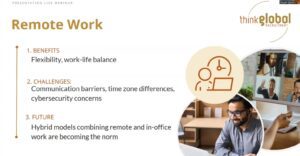
Think Global Recruitment recently ran a webinar where we asked attendees what their preference was for where they work.
In an era characterized by rapid technological advancements and shifting priorities, the traditional concept of work is undergoing a profound transformation. The recent webinar, “Navigating the International Job Market: Trends & Opportunities in Finance,” unveiled intriguing insights into the preferences of finance professionals when it comes to their work environment. With hybrid work emerging as the frontrunner, followed closely by remote work, the implications for the international job market are significant. In this blog, we delve into the results of our poll and the dynamics behind these choices and explore the potential impact on the finance industry.

The Hybrid Work Revolution:
Hybrid work, a model that blends both in-office and remote work, has emerged as the favored choice among finance professionals. This preference signifies a shift towards a more flexible approach to work, where employees can harness the benefits of both worlds. The appeal of hybrid work lies in its ability to strike a balance between the camaraderie and collaboration that an office setting provides, while allowing individuals the autonomy and convenience of working from home. As the finance industry thrives on teamwork and communication, the hybrid model enables professionals to collaborate seamlessly while enjoying the flexibility that modern life demands.
Unlocking the Potential of Remote Work:
Following closely behind hybrid work is the remote work model. The fact that a substantial portion of finance professionals express a preference for remote work showcases the growing acceptance of remote arrangements within the industry. With advancements in communication technology and digital tools, professionals can efficiently perform tasks from anywhere in the world. This shift not only offers employees a greater work-life balance but also enables companies to tap into a global talent pool, diversifying their teams and perspectives.
The Office: An Evolving Landscape:
Interestingly, the least preferred option in the poll was working solely from the office. While this might raise questions about the future of the traditional office space, it’s essential to recognize that the office still holds value. The office environment fosters spontaneous interactions, mentorship opportunities, and a sense of belonging that can be challenging to replicate in remote settings. Therefore, companies may need to reimagine their office spaces, transforming them into dynamic hubs that prioritize collaboration, creativity, and innovation.
Adapting to a Changing Landscape:
The preference for hybrid and remote work in the finance industry underscores the need for companies to adapt to the evolving work landscape. Embracing these models requires a robust technological infrastructure, a focus on communication and collaboration tools, and a shift in management practices to measure employee productivity based on outcomes rather than physical presence. The webinar’s poll results provide a glimpse into the future of work in the finance industry, where hybrid and remote models are reshaping the way professionals approach their careers. This shift is not just about location; it’s about empowering employees to achieve their best work while maintaining a healthy work-life balance. As the international job market navigates these changing preferences, companies that embrace flexibility, foster innovation, and prioritize employee well-being are poised to attract and retain top finance talent in the years to come.

